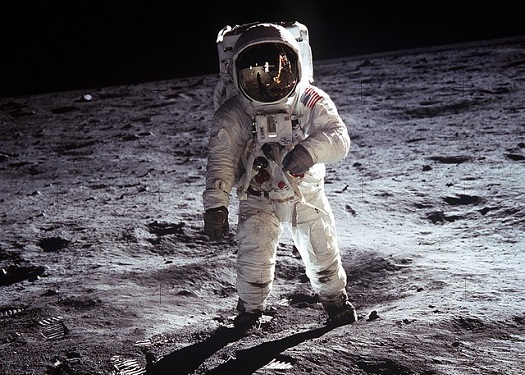This post may contain affiliate links. Please read our disclosure for more information.
A couple of months ago, I wrote a post that honored the American moon landing and wondered if 1969 marked the year of peak competency for America. Here are the two pertinent paragraphs from that post that contrast 1969 America with 2019 America:
Something happened to America. Instead of the eagle landing, the dodo has landed. Oh, sure, we still show flashes of supreme competency—the space shuttle, the internet, and the cell phone immediately come to mind. But when it comes to the everyday competencies of rearing children, managing household finances, mastering workplace responsibilities, and governing waistlines, we appear—to say the least—bewildered. And when it comes to the crucial societal competencies of educating children, cultivating safe communities, providing affordable healthcare, managing pensions, controlling our borders, and protecting the public purse, we appear equally flummoxed.
Again, I don’t want to come across as a nattering nabob of negativity. I sincerely hope I’m wrong. I just can’t say with conviction that America works, that America can tackle any challenge. For far too many Americans, especially those at the helm of our most important institutions, it not only appears that “failure IS an option” but also appears that failure is NO BIG DEAL.
Governing Our Waistlines
Well, during this past week, one of America’s most renowned uber-liberals backed my fear that America reached peak competency back in 1969. Bill Maher used a recent monologue to lament our distressing inability to control our weight. And he even used the Apollo 11 mission to prove that this wasn’t always the case! Here is how Mr. Maher put it:
Europe doesn’t look like [it’s been besieged by obesity] because Europe isn’t always eating for two. We weren’t always like this. Watching the footage of the 50th anniversary of Apollo 11, I was struck by how not-fat everyone in the crowd was. We looked like a completely different race of people. Now, look at us. We wear shirts that our ancestors could have used as a sail.
America 1969

America 2019

There were, of course, obese people when I was growing up in the 60s and 70s. But they were the exception. Today, it’s the reverse. I typically sit in my car while Mrs. Groovy does the grocery shopping at Walmart. And all the time I’m playing a windshield sociologist (45 minutes on average), I will literally count only two or three skinny people. Nearly everyone exiting from or returning to his or her car is overweight. And it’s not just a Walmart or Southern thing. I saw the same depressing condition on a recent trip to Philadelphia and Atlantic City. Skinny was the exception, obesity was the norm.
The point of this post is not to ridicule obese Americans. The vast majority of obese Americans are good people. And their obesity is not entirely their fault. Our food industry knows that human beings are genetically disposed to crave fat, salt, and sugar, and it exploits this weakness with gusto. No, the point of this post is to show that every once in a while I get it right. I believe America reached peak competency in 1969 and Mr. Maher, an unlikely ally, just issued a ringing endorsement of that conclusion.
Obesity and Societal Competency
Obesity isn’t the only measure of societal competency, of course. But it is one of the key measures.
Competent people adjust to new circumstances. Incompetent people don’t. Our food industry became more predatory over the last 50 years. Our response should have been an equally forceful counterattack. Our teachers, pastors, and civic leaders should have been screaming from the rooftops:
Processed food is ruinous. Make your own meals. Eat real food. Don’t fall for the food industry’s trick. It’s not plying its products with fat, salt, and sugar to enrich your life. It’s doing so to make you a junk-food addict and separate you from your money. And it couldn’t care less what the overconsumption of its products will do to your health.
Instead, we did nothing. Our leaders let us down. And we let ourselves down. And, now, as Mr. Maher glumly stated, we look like “a completely different race of people.”
Final Thoughts
Okay, groovy freedomist, that’s all I got. What say you? I say that Americans are less competent than they were in 1969, and I say Bill Maher’s recent monologue backs up that assertion. Am I on to something? Or am I a delusional fool? Let me know what you think when you get a chance. Peace.

Interestingly, we don’t have a lot of obese people here in Portland. Most people are medium size. I see very few obese people. Even at Walmart, the customers are generally medium. However, everyone in that picture from 1969 is skinny. Fat in ’69 is medium now.
Joe recently posted…What Would You Do With An Extra $1,000/month?
Excellent point, Joe. I looked up obesity statistics and most Americans are NOT obese. Obesity is defined as having a body-mass index greater than 30. A majority of Americans are overweight, though. To be overweight, you only need a BMI greater than 25. And it doesn’t take to reach that condition. I’m 6 feet tall and weigh 180 lbs. You look at me and you’ll probably conclude that I’m a fit person. But according to an online BMI Calculator, my BMI is 24.4–just slightly below the overweight designation. Great comment, my friend. Thanks for stopping by.
Mr. Groovy recently posted…This Week in Confirmation Bias – Peak Competency
BMI is a misleading statistic. My son had his high school’s record for dead lift. He was ripped with a lot of very dense muscle distributed across his 6-foot frame. Nevertheless, his BMI said he was obese despite having a very low fat composition. BMI is based upon height and weight alone. It does not take into account the composition of that weight. It can be a reasonable proxy for some non-athletes, but body composition in terms of percentage of fat is a better measure. Can you pinch an inch? Push away from the table and get moving.
Thank you for pointing out that BMI is a very crude measure of obesity. I went to the online BMI calculator to see what weight was necessary for me to be considered underweight. The answer was 136 lbs. And that’s simply ridiculous. Great comment, my friend. Composition of one’s weight is indeed key.
BMI is weight in kilograms (kg) divided by his or her height in meters squared. I made a spreadsheet that calculated BMI every time I entered my weight and when i hit the lower limit of “overweight” my wife said I looked too thin.
I was arguing with someone about the cause of our fatness when I stumbled upon these two stats: The average American consumes 3600 calories a day, 689 calories of which are VEGETABLE OIL. I mean, come on now. If these numbers don’t sound a) ridiculous, and b) completely under our own control, then I don’t know how you can live with yourself. Either you put the responsibility primarily on the source (US!) or an external force.
ps – I wanted to sarcastically add “spoken like a thin man!” but that might be inflammatory 🙂
LOL! Thank you for not being thin-phobic. Thin people have a right to pontificate too! And thank you for pointing out the calorie consumption numbers. Those are pretty shocking. Our worst enemies are ourselves and our ruling elite aren’t helping matters by completely discounting the notion of personal responsibility. Sigh.
There are people actually starving in the world and the United State’s biggest health epidemic is the challenge of having too much food!
The need for personal responsibility is everywhere in this country.
Amen, brother. Discipline equals freedom, permissiveness equals slavery.
i think there’ll be a time when society realizes “low-fat-diet => obesity-epidemic”.
There are significant disincentives to healthy eating.
1) nobody makes money from fasting
2) government subsidies on corn & soy make processed foods from these sources cheap
3) LCHF (low carb healthy fat) contradicts recommendations of several institutions that formulate their recommendations to not-hurt their sponsors.
4) chronic conditions like type 2 diabetes make a lot of money for drug companies.
i’ve lost 100 pounds with my simple 23,000 step weight-loss plan. (Just take that many steps/day and you WILL lose weight.) I attribute my success to ignoring the food pyramid of the USDA, as well as most recommendations of the American Medical Association, American Heart Association, American Diabetes Association.
Look at the research yourself, try what sounds right, and measure how well it works for you. Everyone is different and every recommendation is selling something: Would you like to buy my line of dietary foods for when you are fasting? (Empty cans of air & bottles of distilled water.)
You are so right, my friend. Check out my post this Wednesday. I too had a fitness renaissance by ignoring contemporary wisdom.
A talk radio host I used to listen to said the only obese people you see in Europe are outside McDonald’s and other fast food places.
Having lived in Europe for 3 months where I was a plaza bench sociologist and walking multiple miles a day (plus having a host mom that cooked the Mediterranean diet from scratch most days) I tend to agree.
I’d also reckon to say the late 1960’s were the true American apogee on many fronts including financial and family strength.
I know you teach on many of these topics in your book, so I encourage any new visitors reading this to check out Mr. Groovy’s ebook for the full scoop.
Josh recently posted…5 {Free} Stock Market Research Tools
Hey, Josh. Thanks for sharing your plaza bench sociology work. Mrs. Groovy and I had a similar experience in Australia. I wouldn’t characterize Australia as a thin country. But it certainly wasn’t an obese country. There were obese Aussies, of course, but they weren’t nearly as numerous as their American counterparts. Overall, I would say that Australia is equivalent to 1980 America on the obesity front. Obesity right now is under control, but the warning signs are there. I wish them well. Thanks for stopping by, my friend. And thanks for the thumbs up on my ebook. I really appreciate it. Cheers.
This is so true and a major issue for this country. I can’t help but wonder how much less money would be spent on health care if so many people weren’t becoming sick because of what they consume, how much they consume and how much sedentary activity has replaced physically active endeavors. We really need to tax junk and processed food and use that money to make wholesome foods more affordable and more widely available, something not always the case especially in inner cities. We also need to encourage incentives to reduce health and life insurance premiums for people that actively take steps to improve their health. Imagine how much we can reduce the deficit if our spending on Medicare and Medicaid went down because people were healthy. On Weightwatchers, I read stories every week about people that are able to get off their blood pressure and cholesterol meds, no longer have diabetes and are leading healthier and more active lives. This is what our societal goal should be. Thanks for the good read as always.
Amen, Pat. The majority of our health problems are caused by what we consume. We consume way too much sugar, nicotine, alcohol, cocaine, and opioids. If we were just more mindful and found more healthy ways to entertain our taste buds, relieve stress, and escape the drudgery of life, we could halve our national healthcare bill overnight. But sadly, we find it far more psychologically comforting to blame others than blame ourselves. Damn those bastards at McDonald’s! Have a great weekend, Pat. Cheers.
Don’t curse MacDonalds for giving their customers what hey want. Curse them for taking the tallow out of their frying oil and replacing it with government-subsidized (cheaper) industrial-process-extracted vegetable oils. A higher fat meal full of fats will sate the appetite with smaller portions than one full of processed carbs, esp. sugar and flour. Food scientists want to formulate recipes that taste good. Take out the fat and you take out the flavor. Add sugar and you’ll make it taste better, and the carbs will make you hungry again sooner, so you’ll buy more.
“Take out the fat and you take out the flavor. Add sugar and you’ll make it taste better, and the carbs will make you hungry again sooner, so you’ll buy more.”
Nailed it, my friend. Couldn’t agree more. And you are so right about tallow. Best fries I ever had were cooked in tallow.
Mr. Groovy recently posted…This Week in Confirmation Bias – Peak Competency